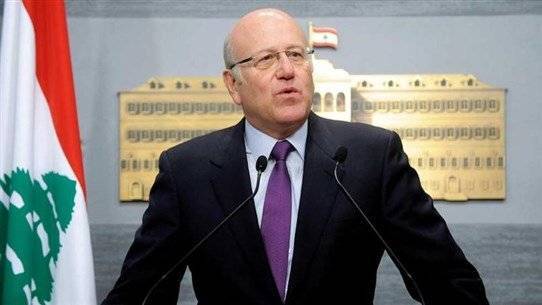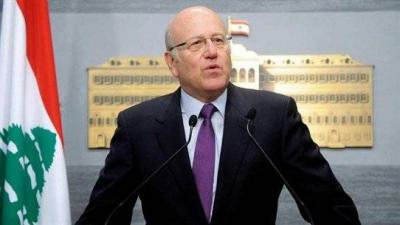The least that can be said about the consultations that Prime Minister-designate Najib Mikati is holding today and tomorrow with parliamentary blocs to gauge their opinion on forming a government is that they remain within the framework of formality. This is not only because they are non-binding for him, but also because the prospects for reaching an agreement on the formation of a fully-fledged government that prevents extensions of the caretaker government remain blocked. Additionally, Mikati's relationship with the leader of the "Free Patriotic Movement," MP Gebran Bassil, is further deteriorating in light of the latter's announcement of his unwillingness to participate in the government.
The Prime Minister-designate is working hard to prepare a government lineup that he can later present to President Michel Aoun to gauge his opinion. However, he knows in advance that Aoun will reject it unless the prospective cabinet composition meets the conditions of his political heir Bassil and aligns with his political ambitions. According to political sources familiar with the current atmosphere around Mikati, although he is keen to consult with the President, he is not inclined to extend these consultations indefinitely. He will have to present a ministerial lineup to Aoun within a maximum of ten days. Either Aoun will approve it with minor modifications that do not fundamentally alter the distribution of ministerial portfolios, or he will reject it outright, which would inevitably activate the caretaker government.
Conversely, some prominent parliamentary sources believe that the "greater jihad" to form a new government has begun because there is a need for an effective government. They state that there is no escaping the formation of this government, which will not be asked to reinvent the wheel, as much as its presence is essential to meet citizens' needs for electricity and medicine and alleviate their daily suffering by ensuring their livelihood, so as to keep the situation under control and secure the required environment for electing a new president within the timeframe stipulated by the constitution, without disrupting it to avoid dragging the country into a governance crisis that could be easily avoided.
The parliamentary sources also highlight the danger of wasting time if the government is not formed today or tomorrow to finalize an agreement with the International Monetary Fund, especially since its representative is currently in Lebanon for an extended period, and we must seize his presence to prepare everything needed from the government to reach a final agreement that allows us to move to the recovery stage. They believe that Parliament is ready to assist the government in reaching safe ground in negotiations with the IMF.
These same sources emphasize the necessity of resuming indirect negotiations between Lebanon and Israel regarding maritime border demarcation, mediated by the U.S. and under U.N. auspices. They state that Lebanon anticipates a final response from U.S. mediator Amos Hochstein in the next few days regarding the Lebanese side's previous response.
Thus, the alternatives proposed in case an agreement on forming a new government fails are inappropriate and will not make a difference, as they revolve around either renewing the caretaker government's confidence in the parliament or replacing some ministers with others, provided that the current distribution of ministerial portfolios among sects is upheld. Political sources accompanying the process note that the government is considered resigned as soon as a new parliament is elected and cannot be constitutionally revitalized because its resignation did not stem from the resignation of its head. Therefore, such an unprecedented step is viewed as an attempt to escape forward.
In response to a question, sources clarify that the role of the international community, particularly France, remains in urging the relevant political parties to expedite the formation of the government. They cannot substitute for them as they distance themselves from overt interference in internal affairs, and they currently lack any means of pressure other than advising parties involved to help themselves as a condition for the friends of Lebanon to provide the necessary aid.
These sources reveal that what matters to the international community is maintaining stability in Lebanon, emphasizing that the Lebanese government knows well what is expected of it internationally, particularly regarding its commitment to reforms. Without these reforms, Lebanon cannot translate its intentions stated in the agreement with the IMF into executable steps. They warn of delays in responding to the list of conditions laid out, as without it, the declaration of intentions remains mere ink on paper.
According to senior French officials responsible for the Lebanese file, the presidential elections will take place on time, and there is no justification for postponing or deferring them indefinitely. They urge against betting on the impossibility of completing the presidential election because anyone who speculates on that now will find their wager misplaced, differing from their previous conjecture that the parliamentary elections would be delayed and the country would face continuous vacancies.
They point out that countries interested in Lebanon's stability, led by France, will not tolerate those obstructing the timely presidential elections, warning that there will be grave consequences for those who impede them, including sanctions that could extend beyond European nations to the international community.
Thus, Mikati prepares, as soon as he finishes the non-binding parliamentary consultations, to embark on the "greater jihad" required of him to form the government, seeking to gauge the willingness of political forces, whether they named him for the premiership or not, to engage without insurmountable demands in the process of forming a government. Otherwise, the alternative before him could involve fighting the "smaller jihad" by activating the caretaker government, especially since he has previously hinted at the possibility of convening the Cabinet if necessary, while also considering that the caretaker government remains fully functional.
In this context, it is rumored that Paris does not mind activating the caretaker government if Mikati encounters obstacles that prevent the formation of a new government, provided that protection is ensured for it by the major supporting forces.
The central question remains: Will Mikati resort to using his last cartridge by activating the caretaker government if he fails to form a new one? What will Aoun's stance be on this? Will he provide political cover for it, or will he resist it in response to Bassil's wishes? Consequently, how will the elected parliament act? Who will agree among the parliamentary blocs to maintain the status quo? What will they communicate to the Lebanese public? And where will they stand regarding the necessary legislation that the parliament was forced into with a caretaker government under Hassan Diab's presidency?
Thus, Mikati faces a challenging task, one that is not easy and involves the possibility of activating the caretaker government, as this step would remain less costly than forming a government teetering between a camp insisting it be political and another that is non-political, but rather of a different kind not dominated by "Hezbollah." Meanwhile, the demand for a national unity government has become a relic that brings together opposites under one roof, suffering from the disruptive evils that have afflicted all previous coalition governments.




